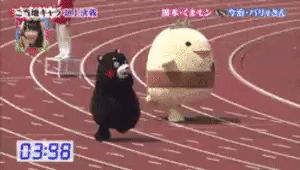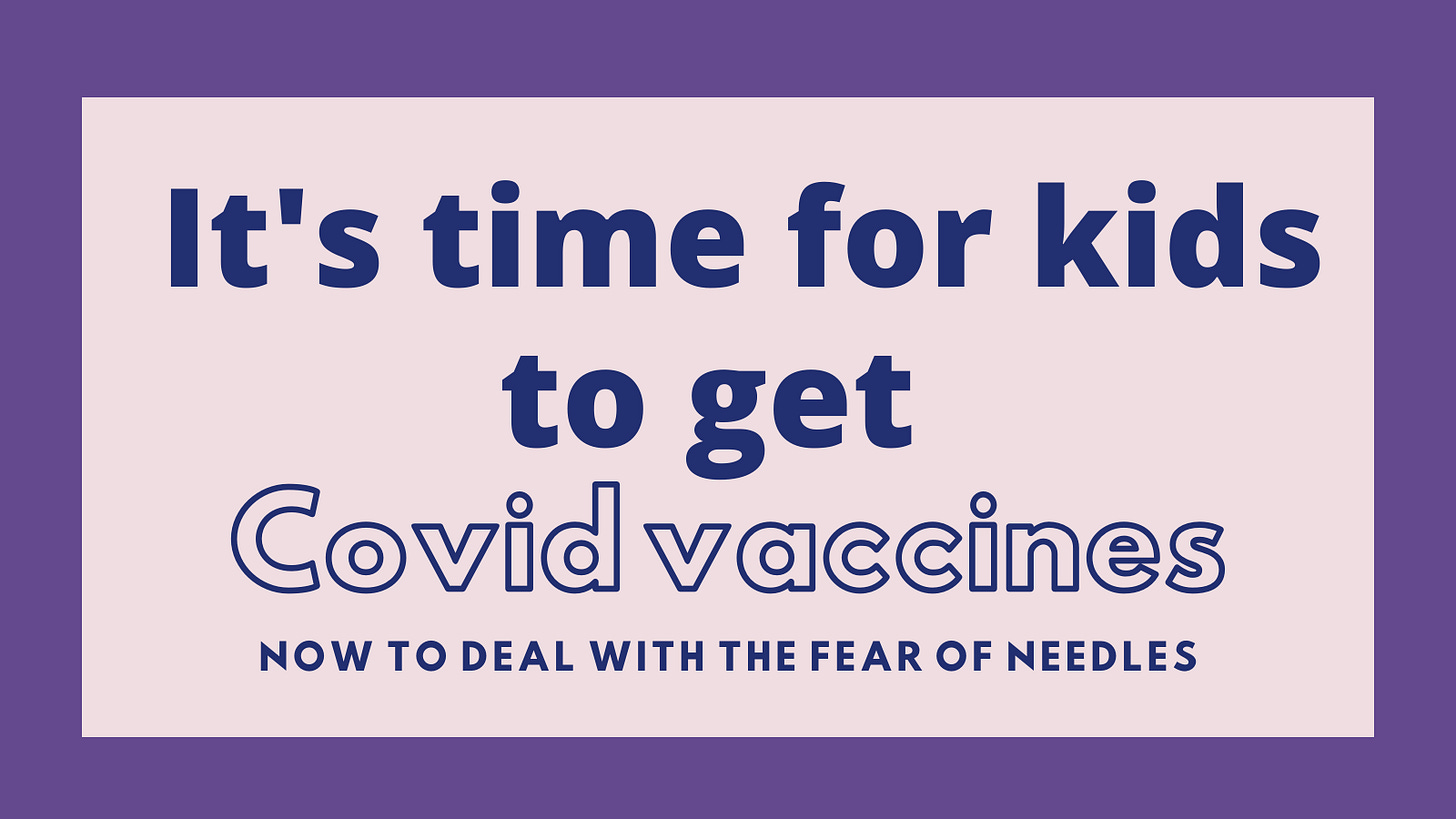How to prep kids for the Covid vax
Parents, a doctor and a 10-year-old give tips on handling a fear of needles
Welcome to At The End Of the Day. I’m Hannah Sung and I write this newsletter for a people-first perspective on the news.
If you love reading this newsletter, pay-what-you-wish via Patreon.
Covid vax and needle fear
A needle has never been so loaded.
Many people said they got emotional when they received their first Covid vaccine and I was no exception. I remember rushing to the pharmacy alone, in the middle of a workday. When I floated back out, almost-dazed, I was inexplicably dreaming of Christmas (it was April).
Now we’re here. We’re actually getting into the Christmas season and our kids are finally about to get what all parents have been dreaming of: Covid vaccines for children.
When I first saw a Tweet saying vaccines had been approved by Health Canada for children ages 5 to 11, tears sprang to my eyes.
My kids, however, didn’t share the tears of joy.
“You’re going to get a Covid vaccine soon,” I said with a smile.
“WHAT?” My 7-year-old responded. “I don’t want a needle!” Wait. Is she for real? Okay. Keep the voice even.
“This is a needle you really want to get.” Half my parenting job is just tamping down my reactive self and pretending I am a calm lady. “This means the pandemic can finally be over one day.”
“But I don’t LIKE NEEDLES.” I couldn’t argue with this. I quickly realized that for some young kids, Covid be damned, this moment is all about the needle.
Thinking back to the scariest things in childhood, they included, in no particular order: the basement with the lights off, strangers in the dark, getting lost in the dark, everything in the dark and needles.
As kids, we ramped up each other’s fears, hyping up “neeedles” on the playground, really leaning into that hard “e.”
How to prep kids for a needle
This week, and for months ahead, parents are trying to prepare their kids for the vaxx, dealing with a fear of needles in households across the country.
I asked if anyone has tips.


What parents suggest
Clearly suggestions are age-dependent because being five years old is a world away from being 11 but here’s a great, quick-hit list of suggestions from parents on Twitter:
🟢 Rewards (candy before, during and/or after)
🟢 A show on your phone
🟢 Bring a stuffy
🟢 Headphones with favourite tunes
🟢 Numbing creams and patches (I haven’t ever used these myself and my own kids have had so many shots by this point I think we’re good, but they are available without prescription which is good to know if you want to check them out)
What a 10-year-old suggests
I asked my 10-year-old friend Zelda, who lives across the street and has already been vaccinated, what it was like the moment she got the shot.
“I looked sideways,” Zelda said, explaining that she looked away. “And the nurse said, ‘On the count of three,’ and she did it on one.” I laughed.
“That’s also what happened when I got my ears pierced,” Zelda remembered. “She said she would count to five, and she did, but she did it on three.”
A ha! The tactics of experienced professionals.
Speaking of professionals, our own family doctor is a champ. And she taught me from my earliest days as a parent, that we don’t want our children to develop negative emotional memories of going to the doctor or getting their shots.
What a doctor suggests
As Dr. Katie Birnie says in this Instagram video on fear and pain management, we want to set children up for success. After all, soon they’ll need to go back for a second dose.
Thank you to ATEOD reader Christine, for sending me this Instagram post
“We need to be honest with our kids but also use words that are neutral, not exaggerating or creating fear, so we can talk about things in a more neutral or positive way that also creates space for their own experience. Pain is subjective,” Dr. Birnie says.
You can discuss your pain management strategies in advance, Dr. Birnie says, and give them options for how they can address what’s coming.
For example, you can ask:
🟢 Do you want to bring your iPad?
🟢 Do you want to look away from the needle?
🟢 Do you want to sit in my lap?
And then you can give your child a “job,” like sitting still as a statue.
And best of all, you can make a plan to celebrate together afterward.
The big picture
Booking a Covid vaccine appointment takes grown-up, vaccine-hunting, brisk, no-nonsense energy. But handling our kid’s fears is about slowing down and seeing it from their point of view.
And sometimes, the older kids in this 5 - 11 year old cohort have the ability to be super-mature and see it from your grown-up point of view.
Like Zelda, my 10-year-old friend. She actually got her Covid vaccine early, as part of a study. Zelda is someone who has been known to jump away from her doctor to avoid a needle (at age seven) and still says, “I hate them, they make me nauseous.”
But her parents explained to her the stakes of the Covid vaccine, and in her case, being part of a study. Now that the jab is available to all kids her age, Zelda says, “I’m really excited for everyone to get vaccinated.”
“After we got my first needle, we were walking to the car, and my parents said, ‘This is a real opportunity to make real change and we’re really proud of you for doing this because this is going to help a lot of people.’ And I was happy because I didn’t even realize I’d be helping a lot of people.”
Which is a really community-minded, science-backed way to manage your own fear. Look at the bigger picture. If Zelda can do it, I think many of the older kids can do it, too. For the younger children, bring all the candy. And godspeed.
Thanks for reading, if you have any vaccine or needle stories, put them in the comments!
Hannah
✨✨✨ At The End Of the Day is edited by Laura Hensley ✨✨✨
Further Reading
Donate to UNICEF’s #GiveAVax Covid-19 Vaccine Fund More than 85% of eligible Canadians have received their first dose of a COVID-19 vaccine. But the situation is very different for families and communities in low-income countries, where only 2% of the population have received at least one dose.
Tracking Coronavirus Vaccinations Around the World, The New York Times
After detecting the Omicron variant, South Africa feels ‘punished’ by global travel bans, The New York Times
Stephanie Nolen on Twitter, Global health reporter for The New York Times. I followed this yesterday, compelled by the unfolding situation
Here’s a free workshop from the Paediatric Pain, Health and Communication Lab at University of Guelph, happening December 14:


Needles don’t have to hurt, This is a handy at-a-glance list of age-appropriate tips from doctors
Be A Super-Ally with the 5Ds, I sent a newsletter a few weeks ago called, Anyone can experience the bystander effect. After seeing that, my friend Joey sent me this link to a children’s version in video, in case you want to share it with your kids
Have you heard?
Want to know more about what I do? I mostly sit here at my desk, but there’s writing time (i.e. hiiii, what I’m doing now) and audio time, when I’m making podcasts with our one-year-old podcast production company, Media Girlfriends. Here’s a conversation between myself and co-founders Nana aba Duncan (in the pic) and Garvia Bailey. Have a listen!


It’s the little things
Forget Black Friday! Buy yourself something small and sustainable instead. Smell nice things and gift some blooms (or a snack on a spoon) to someone you love. Click through to find discount codes from last week’s Gift Guide. You can use them through to December 1.
And congrats to the Gift Guide giveaway winners! It was a really nice giveaway packed with great things. The winners are Sarah T. and one more person I’m trying to get in touch with. Fingers crossed — check your inbox!
More high fives go out to Miranda B. for being the Binu Binu Soap House giveaway winner and Nicolle for winning a books prize pack, including Huma Abedin’s memoir Both/And: A Life in Many Worlds, courtesy of Simon & Schuster Canada.






